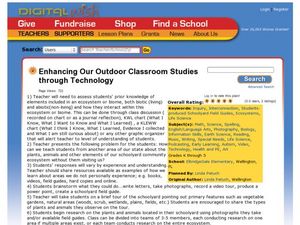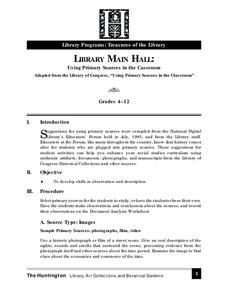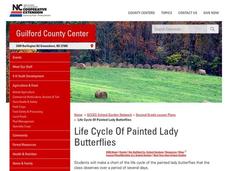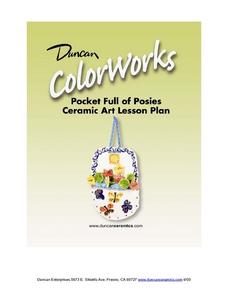Curated OER
Enhancing Our Outdoor Classroom Studies through Technology
Combine science, math, and more using this resource. Learners use technology to share video and other information about their community with people throughout the state. They learn about the environment, identifying native plants, record...
Curated OER
Using Primary Sources in the Classroom
Scholars study a historical photograph to make predictions of what happened right after the picture was taken. They research a variety of different topics and use primary sources to answer questions about common food, fashion trends, and...
SeaWorld
How Big is a Blue?
Whales are all big, but some are larger than others! Kids will love sorting the 10 whale species by size at their desk (whale cut-outs provided). Next, use a whale rope to visualize how long each of these whales actually is. A large...
Ocean Explorer
Easy as Pi
Seamounts are large, extinct volcanoes that rise up from the bottom of the ocean floor. They are a relatively new landform in the scientific community, and this instructional activity invites students to learn about the amazing diversity...
Curated OER
Lights! Cameras! Action!: Creating a Drama About the Lyme Art Colony
Discuss the lives of artists in the Lyme Art Colony in the 1900s with this resource. Young historians write and perform a short scene depicting individuals who lived in the Griswold boardinghouse, used by the colony artists. They use the...
Curated OER
The Impact
Learn about the destruction of the rainforest by analyzing statistics. Young learners make an original line graph showing destruction in the rainforest. Additional activities include making a collage, sequencing Dr. Seuss' The...
Curated OER
Plant Parts and their Function
Discover why plants are important to our world. View plant parts and categorize them as stems or buds. Students do a cut and paste of pictures of plants into correct categories. Students also plant a carrot top,and record...
Curated OER
"Lettuce" Learn About the Water Cycle
Young scientists investigate the water cycle through a lettuce seed experiment. For this experiment, learners plant lettuce seeds inside of a ziplock bag in order to create a small greenhouse. They observe condensation and precipitation,...
Curated OER
Language Arts: Ode to the Ordinary
Eighth graders select ordinary objects, determine their uses, and write poems about them. Once they select an object, they create a web about its uses to serve as an outline. Once they have written their own odes, 8th graders meet in...
Curated OER
Nutrients Nutrients We Need
Second graders examine the six nutrients humans need to maintain good heath. In this ecosystem lesson, 2nd graders learn about how plants grow and compare how humans need nutrients from plants to how plants need nutrients from the soil....
Gecko Mathematics
Gecko Mathematics: Multiplying Unit Fractions
Make learning visible! Have your mathematicians follow along as you use paper strips to demonstrate the concept of multiplying unit fractions. Then, offer a different way of solving the problem using a number line. Finally, introduce the...
National Museum of the American Indian
The A:Shiwi (Zuni) People: A Study in Environment, Adaptation, and Agricultural Practices
Discover the connection of native peoples to their natural world, including cultural and agricultural practices, by studying the Zuni people of the American Southwest. This lesson includes examining a poster's photographs, reading...
NC Cooperative Extension, Guilford County Center
Life Cycle Of Painted Lady Butterflies
The Very Hungry Caterpillar is the inspiration for this project-based learning activity. Kindergartners create a lifecycle chart for a butterfly with four sections: egg, caterpillar, pupa, and butterfly. It is a three-dimensional...
Chymist
Landfills and Recycling
Examine the nature of landfills through experimentation. Scholars build miniature landfills and monitor changes over a six-week period. Observations allow individuals to draw conclusions about the different types of trash and their...
Curated OER
Observing the Pumpkin Cycle
Students observe and listen to nonfiction books about the life cycle of pumpkins. They practice early reading skills in a shared reading related to pumpkins. They observe the life cycle of a pumpkin including growth and decay.
Curated OER
Social Studies: Getting to Know You
Students in kindergarten and college students engage in dialogue designed to help them get to know each other. They meet at three discussion centers, where the students express what makes them happy, how they are seen, and how they are...
Curated OER
Our Playground!
First graders observe and explore the playground's environment by walking around the playground, followed by a group discussion of what they observed. They then divide into groups and participate in centers, their brought back together...
Curated OER
Describe common actions and objects in specific and general language
Having a diverse and well-developed vocabulary make for both good readers and good writers. The class discusses basic grammar, such as nouns, verb, and adjectives. They then view a series of pictures and work as a class to create simple...
Education Outside
Honey Tasting
Young scientists will be abuzz as they sample and compare the tasty treats produced by Apis Mellifera.
Curated OER
Pocket Full of Posies: Ceramics
After studying the plant or flower life cycle, have the class create a basket of flowers out of clay. They hone their ceramics skills while they push, pull, then paint clay to look like flowers they've seen in nature. There are several...
Desert Discoveries
What's the Buzz on Native Bees?
Young biologists describe the different types of bees that are native to the Sonoran Desert. They look at the nesting and feeding requirements of the insects, and study how they are able to pollinate many plants found in the environment....
Curated OER
Acid Rain
Simulated acid rain, a dilute sulfuric acid solution, needs to be prepared for this demonstration. After a condensed lecture on acid rain, you will apply the solution to a sample of granite and a sample of limestone. Your young...
Curated OER
Let's Learn About Plants!
Take your class on a nature walk around the school and have children assume the role of "Plant Hunter" as they go. The goal is to explore the different parts of a plant. They return to the classroom to discuss the parts that they saw and...
Curated OER
Let's Grow Plants!
Students read and dramatize the stories "The Tiny Seed" and "The Carrot Seed" as an introduction to seeds and what they become. They work in small groups to plant their own seeds and over the span of a week (+ or -)students keep track of...
Other popular searches
- Botanical Gardens
- Flower Gardening
- Ecological Gardening
- Secret Garden
- The Secret Garden
- Vegetable Gardening
- Garden Geometry Project
- Vegetable Garden
- Garden Geometry
- Garden Design
- Organic Gardening
- Garden Vocabulary























